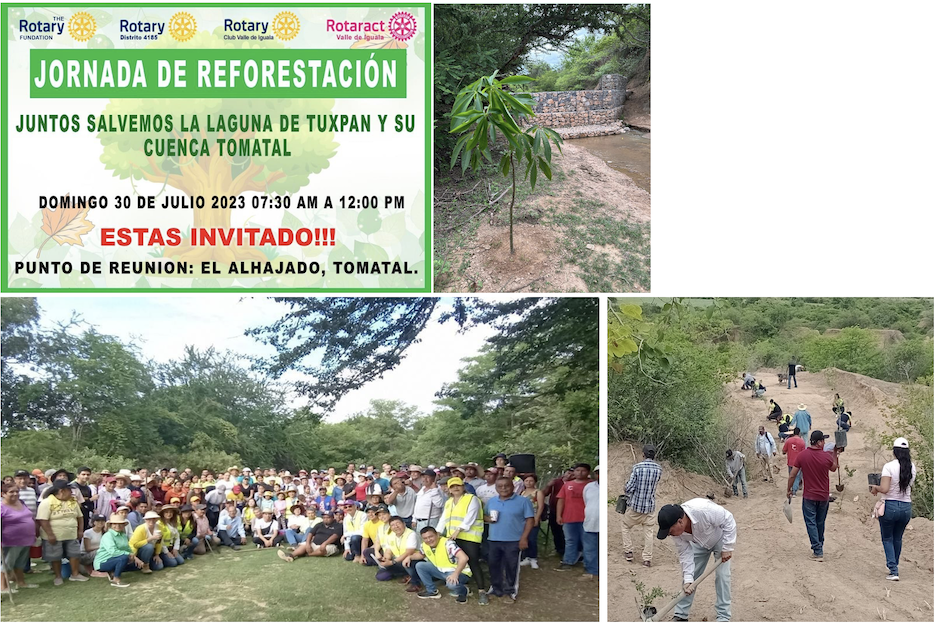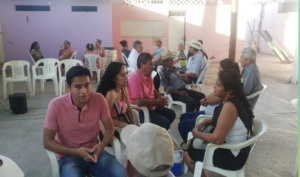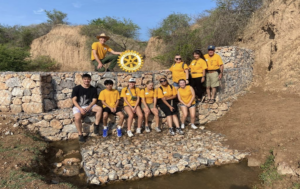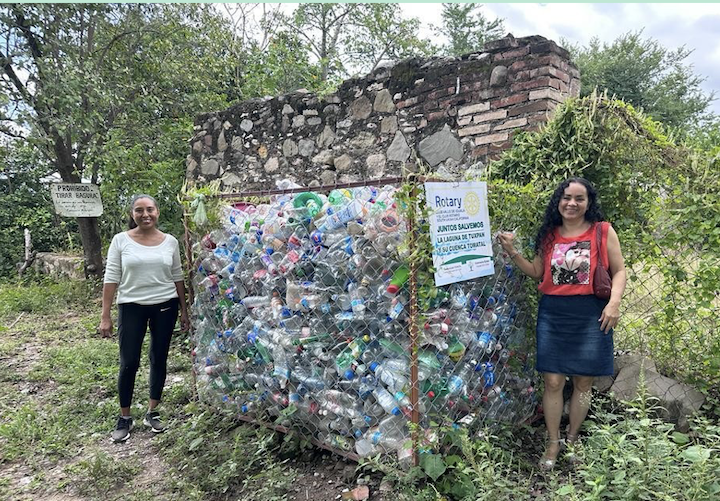by Michael Drake, Rotary Club of Tucson Verde
Lake Tuxpan is near the municipality of Iguala de la Independencia in the State of Guerrero, México. Created in the 1940’s as a reservoir for drinking water and irrigation, the lake and its shoreline had become very polluted with garbage and silt eroded from nearby bare, denuded hillsides. Erosion of the hilly watersheds was dumping 28,700 cubic meters of sediment a year into the lake, reducing its average depth from 24 to 4 meters. This pollution severely damaged the fish habitat, recreational opportunities, and the supply and quality of potable water. Approximately 130,000 people live in the area.
This article describes the solution proposed by the Rotary Club of Valle de Iguala under the leadership of then-President Elvira Duran-Ramirez, leading to a Global Grant under the Environment Area of Focus.
The Valle de Iguala Club was the Host Sponsor, and the Rotary Club of Tucson Verde in Arizona, USA was the International Sponsor. The project is a good example of successful collaboration of Rotary clubs, Rotaract clubs, community environmental organizations, local governments, technical advisors, community volunteers, and international Rotary project fairs. The article concludes with suggestions on how to develop a successful Global Grant project.

Lake Tuxpan is near the municipality of Iguala de la Independencia in the State of Guerrero, México.
The project included reforestation of nearby hills to prevent erosion of sediment into the lake, dredging built-up sediment out of the lake, and training 150 local citizens on environmental measures to maintain the health of the lake to promote recreation, fishing, and safe drinking water,
The $40,000 US Global Grant was funded by contributions from 11 Rotary clubs in the US and Mexico, District Designated Funds from three Districts, one individual, and ESRAG. The project included four cooperating organizations: the municipal governments of Iguala de la Independencia, Tuxpan, and Tomatal, and the Ecological Park of Iguala.
Despite an almost 18% devaluation of the peso during the grant period, this modest budget was leveraged through in-kind support and negotiation to achieve the project goals. The Host Club persuaded suppliers to reduce the cost of nursery stock, and 3,500 trees were planted, only 12.5% below the target.
Rotarians and other volunteers cleaned up the garbage and debris around the lake and nearby ravines and micro-basins. Then the team built three gabion basket retaining walls in the ravines. The walls permit rainwater to flow through but stop silt from eroding into the lake.

A nursery for indigenous trees and an irrigation system was established. Rotarians recruited a huge group of volunteers to plant trees. “Together, we’ll save Lake Tuxpan and its watershed in Tomatal. You’re invited!!!” read the flyers.
A nursery for indigenous trees and an irrigation system was established. Rotarians recruited a huge group of volunteers to plant trees. “Together, we’ll save Lake Tuxpan and its watershed in Tomatal. You’re invited!!!” read the flyers.

Using videos, printed materials, and classes, two Mexican environmental organizations trained 150 community members to maintain the retaining walls; cultivate and care for the plants to reforest the hillsides; and create community awareness of environmental challenges and how to respond to them.
Using videos, printed materials, and classes, two Mexican environmental organizations trained 150 community members to maintain the retaining walls; cultivate and care for the plants to reforest the hillsides; and create community awareness of environmental challenges and how to respond to them.
The project further strengthened local capacity by recruiting and educating 20 local people to serve as environmental trainers. Citizen committees were formed to manage the collection and storage of plastic waste in 22 cages. Over 20 tons were collected by the end of the grant project. The project also included focus groups to monitor the knowledge gained and the management of the dams, waste collection, the plant nursery, and the newly-planted trees.
The local municipalities of Tomatal, Tuxpan, and Iguala de la Independencia provided essential assistance in access to the ravines, construction of the dams (including lending earth-moving equipment), and raising community awareness and support. Their ongoing engagement will be vital in removing silt and garbage collected by the dams in advance of the rainy season every year.
The Rotary project inspired the state and local governments to dredge the lake and work out an agreement with local communities on where to deposit the sediment.

District 5495 Rotaract tour.
Significance of Project Fairs: The project was presented at the 2022 annual Friendship Conference and Global Grant Exchange, connecting Districts 5495 and 5500 in Arizona with Mexico, primarily D4185 in central México. For 20 years the location of the conference has alternated between Arizona and México. The conference frequently coincides with the Dia de los Muertos, a Mexican tradition that makes the conference fun and festive.
The 2022 Project Fair was combined with ESRAG’s first-ever environmental tour, organized by California Rotarian Salvador Rico (South Ukiah) Rotary Club, founder of Cleaning the Rivers of the World.
Participants witnessed the dire condition of the lake and hillsides and learned of the solution proposed by RC Valle de Iguala.
As a result of the project fair, the Rotary Club of Valle de Iguala teamed up with the Rotary Club of Tucson Verde in D5500, a relatively new caused-based club whose programs and projects focus on environmental issues, and quickly organized the global grant project. Very instrumental in planning and implementing the grant was Erik Friend, an environmental and community activist and member of the Rotary Club of Jardines de Cuernavaca.
The environmental global grant was approved, then launched on March 31, 2023. By July of 2023, visiting Rotaractors from D5495 were able to pose with one of the completed gabion dams on ESRAG’s second international environmental tour.
The project has been successfully implemented and the final report has been filed and accepted. Because of the close relationship that has developed between the Valle de Iguala and Tucson Verde Rotary clubs, a Rotary Friendship Exchange is planned.
Suggestions for applying for Global Grants:
- Be sure your district and your club are Qualified to participate in Rotary Foundation grants.
- Vet your partner Sponsor club well. You want a diligent, reliable partner. Ideally, members of your club personally know and have visited the partner club. Having an unreliable partner can result in misuse of funds, violation of the Terms and Conditions, and sanctions.
- Once you start an application and get a Global Grant number, there is a time limit within which you must submit your application. So before doing that, plan the details of your project and explore funding. When submitted, you want your application to be complete, so the Regional Grant Officer (RGO) assigned to the host district does not ask for more information and clarification, thereby delaying approval and funding.
- Complete a proper Community Needs Assessment. Show how the project is sustainable, and describe how the results will be measured.
- Simplify your application. Designating more than one Area of Focus generally is not necessary and requires more work to complete the application. Limiting your Area of Focus to the Environment, for example, does not preclude your project from enhancing clean water, good health, economic development, and learning.
- Similarly, limit the number of Cooperating Organizations to only those that are necessary. Each requires execution of a Memorandum of Understanding (MOU) with the resulting potential disputes and complications. Again, this would not preclude you from consulting with that organization for assistance with the Community Assessment, technical advice, or listing the organization as a vendor.
- Know what resources are available to help you and use them as you plan your project. Rotary’s page on Global Grants links to planning tools for each phase of the project from community needs assessment to monitoring and evaluation. From the Global Grant page you can link to the Environment Area of Focus Policy Statement and the Environment Guidelines for Global Grant Funding. Consult with your District Rotary Foundation Committee, the Cadre of Technical Advisors, and the assigned Regional Grant Officer. The Learning Center on the RI website also has excellent tutorials and guides.
Preparing a successful Global Grant application may seem like a daunting prospect. Don’t be discouraged. There is a lot of help — and we want our contributions to the Annual Fund to be used wisely and our projects to be effective and successful.
Michael Drake is PDG of District 5500 and co-founder and charter president of the Rotary Club of Tucson Verde, Arizona, USA. He is a recipient of the RI Service Above Self Award and the Rotary Foundation Citation for Meritorious Service. A lawyer, he was honored in 2023 by the Board of Governors of the State Bar of Arizona for 50 years of service to the community and legal profession of Arizona.
